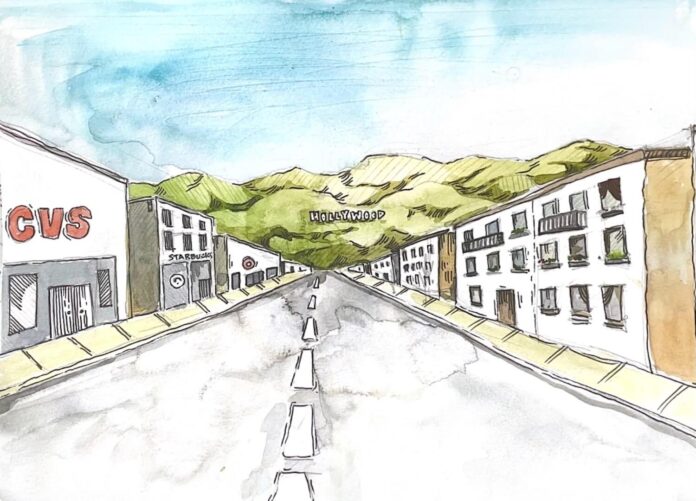In 2015, LA created a plan known as the Mobility Plan 2035 that would upgrade thousands of miles of streets to have safe bike lanes and other infrastructure. It was ambitious, but as with many plans in this city, it got bogged down in the political process — council members exercised their prerogative power to stall street redesigns and slowed implementation to a crawl. Though it was passed seven years ago, the city has only implemented 3 percent of the plan. That was not a typo — 3 percent is all that has been implemented. Frustrated at this snail’s pace implementation, a group known as Streets For All wrote a ballot measure known as Healthy Streets LA that would force the city to implement the mobility plan every time it resurfaced a street. I’m a cyclist and transit rider, so my interest was piqued by the initiative — there was a plan since I was 12 years old that would have made moving around so much easier and the city just… didn’t implement it?
The initiative gathered more than 100,000 signatures and was sent to the city council, which could have chosen to approve the initiative outright and avoid the need to put it on the ballot for 2024 (as the signatures were submitted too late to go to a vote in 2022). On Aug. 24, 2022, LA City Council decided that rather than take up the initiative right then and there, they would push the initiative to 2024 and adopt a separate, council-written proposal, that had an “equity lens” known as Safe Streets.
According to Streetsblog, part of the reason the Healthy Streets initiative was not taken up by council was the objections by advocates who said the plan does not properly center equity. In exchange for pushing to replace the initiative with something that prioritized equity, they received no substantive initiative. Hundreds of people die on LA streets every year, and there will be at least another two years of delay before the Healthy Streets initiative can implement the vital infrastructure necessary to reduce these numbers. I was floored when I read Streetsblog’s article. The Healthy Streets initiative was opposed by advocates for equity on the basis that it didn’t properly center equity — even though the status quo surely does not.
What is the point striving for “equity” when the people who claim to support it use it as an excuse to thwart any substantive attempt at reducing traffic deaths that disproportionately affect people of color in LA? These sorts of “equity advocacy” nonprofits aren’t merely fighting against initiatives for safe streets — a number of them opposed Assembly Bill 2011 (AB 2011) which would help replace aging strip malls with apartment buildings and has the potential to create millions of desperately needed new housing units. According to nonprofits such as the Western Center on Law and Poverty, the law’s provisions might “undermine local equitable development efforts,” by making it easier to build apartments without going through discretionary permitting regimes.
One could say that Assembly Bill 2011 or the Healthy Streets initiative ought to be subject to higher demands — that AB 2011 ought to include more subsidies or the Healthy Streets initiative should have a faster timeline. But the alternative to these laws isn’t a perfect bill addressing everyone’s concerns — it’s nothing.
There is a name for an ideology that demands a much higher standard of new ideas and lets the status quo off scot-free: conservatism. The hundreds of traffic deaths per year on LA streets are inequitable. The dizzyingly high rents from California’s housing shortage are inequitable. One might think that self-proclaimed advocates for equity would be fighting on the front lines to pass laws in order to chip away at these issues, but no — a surprising amount of them have decided that the status quo is preferable to a change that does not meet all of their demands.
Of course, many of us are a little conservative in our temperament — change can be scary. However, change is necessary and often good. Maybe our favorite taco joint or Thai restaurant will be converted into some new apartments. Maybe you won’t be able to take a right turn on a slip lane when you’re driving home from a long day at work. But the status quo is worse, and we should acknowledge this fact — many “equity advocates” clearly don’t.
Oxy and its students want greater equity and justice in the world, and I believe that is a worthy and important goal. But we must remember that equity and justice do not come from accepting the horribly inequitable status quo as superior to a currently unrealistic, yet-to-be attained alternative. Incremental progress is still progress, and the Nirvana fallacy is still a fallacy. A more just and equitable world comes from long, hard work — we must open our wallets, dedicate our time and get results, not problematize incremental progress.
Equity and justice are implemented, not merely stated.
![]()































